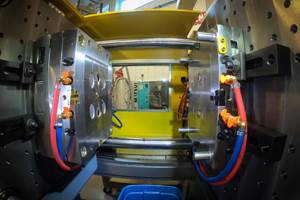Angling for “Big” Advantages in Automotive Tooling
This shop hopes to capitalize on growing opportunities in a different market by adding to its large-part machining capacity.
Although Iowa “isn’t exactly a hotbed” of plastic injection molders, large-part machining capability helps keep customers turning to MSI Mold Builders rather than sourcing tools closer to home, says company President Roger Klouda. With a recent 12,000-square-foot facility expansion, the company plans to double down on this competitive advantage while gaining enough capacity to capitalize on growing opportunities in the automotive market.
Completed this past December, the addition brings the Cedar Rapids plant to a total of 47,000 square feet of production space. The new area is dominated by a massive moving-column, five-axis OMV Formula HMC from Parpas America with about 20 feet of longitudinal travel and 12 feet of vertical travel. By comparison, two five-axis bridge-types that have historically handled the bulk of the shop’s large-part finishing work feature travels of about 9 feet in X and 6 feet in Y. Plans are in the works to install a similarly large, three-axis boring mill to handle roughing, and two new 30-ton cranes have more than doubled lifting capacity. All in all, MSI can now comfortably accommodate molds weighing more than 100,000 pounds, Klouda says. Previously, anything larger than about 70,000 pounds would have presented significant challenges. He adds that the addition of a 25-ton crane to the company’s second, 22,000-square-foot facility in Greenville, S.C., will help support larger mold-building and repair operations for customers in the Southeast as well.
So far, investment in the new space has totaled about $3.5 million, but Klouda says it should be more than worth it. Specializing in outsized work has always helped limit competition for MSI. Overseas suppliers face prohibitive shipping expenses, while domestic operations that lack the right equipment face a costly barrier to entry. He adds that large-part capability also boosts leverage with customers that prefer to source jobs involving both large and small molds from the same place, even if that means shipping from Iowa rather than a more local supplier. The new equipment will amplify these benefits by not only expanding the potential range of work, but also facilitating simultaneous production of multiple large molds rather than just one. The expansion also provides much-needed assembly space, an increasingly scarce resource in recent months.
MSI also hopes to use the additional capacity to parlay its large-part expertise into automotive work. That’s new ground for the shop, which has historically had a large presence in the heavy truck, agricultural equipment, recreational vehicle and medical industries, among others. However, given the holes left by casualties of the economic downturn and a recent study that projects a $6 billion capacity shortage in automotive vendor tooling (visit short.moldmakingtechnology.com/toolstudy for more information), Klouda says he views this industry as rife with opportunity. To that end, the company is exploring partnerships with a few different molders in order to better understand the terms, conditions and expectations associated with this new variety of work. It has also hired a salesperson focused solely on automotive business, starting with tools for non-cosmetic, non-interior parts. Although he emphasizes that the company’s gradual entry into this work is more about diversification than any dramatic change in direction, Klouda hopes automotive might eventually account for as much as 10 percent of sales. “We want to be a mold shop that does automotive, not an automotive mold shop,” he says.
Related Content
Editorial Guidelines: Editorial Advisory Board
The Editorial Advisory Board of MoldMaking Technology is made up of authorities with expertise within their respective business, industry, technology and profession. Their role is to advise on timely issues, trends, advances in the field, offer editorial thought and direction, review and comment on specific articles and generally act as a sounding board and a conscience for the publication.
Read MoreThe Role of Social Media in Manufacturing
Charles Daniels CFO of Wepco Plastics shares insights on the role of social media in manufacturing, how to improve the “business” side of a small mold shop and continually developing culture.
Read MoreHow to Improve Your Current Efficiency Rate
An alternative approach to taking on more EDM-intensive work when technology and personnel investment is not an option.
Read MorePredictive Manufacturing Moves Mold Builder into Advanced Medical Component Manufacturing
From a hot rod hobby, medical molds and shop performance to technology extremes, key relationships and a growth strategy, it’s obvious details matter at Eden Tool.
Read MoreRead Next
Are You a Moldmaker Considering 3D Printing? Consider the 3D Printing Workshop at NPE2024
Presentations will cover 3D printing for mold tooling, material innovation, product development, bridge production and full-scale, high-volume additive manufacturing.
Read MoreHow to Use Strategic Planning Tools, Data to Manage the Human Side of Business
Q&A with Marion Wells, MMT EAB member and founder of Human Asset Management.
Read MoreReasons to Use Fiber Lasers for Mold Cleaning
Fiber lasers offer a simplicity, speed, control and portability, minimizing mold cleaning risks.
Read More.png;maxWidth=970;quality=90)







.jpg;maxWidth=300;quality=90)

.png;maxWidth=300;quality=90)













